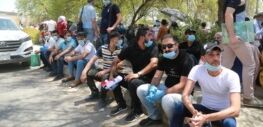正文
新冠病毒危机在阿拉伯青年中制造恐惧和怀疑
Sama al-Diwani and her college sweetheart had big dreams.
Her boyfriend, Athir Assem, was planning to open a business in Iraq. She was preparing to go to England, where she would spend a year in training so that she could work as a pharmacist. After that, they would reunite, get married and start a family.
Those dreams came to a stop with the coronavirus health crisis. Al-Diwani's university education is now on hold. Her family's earnings have gone down by 40% and she worries about losing her job at a local pharmacy.

Assem has delayed plans for launching his business. He wanted to sell baked goods.
Al-Diwani, 24, and Assem, 26, are among millions of young people whose plans for work, education, and marriage have been changed by the pandemic. Such unrest is common in many areas, but the sense of hopelessness is a big concern in the Middle East. There, war, displacement and disease have left a generation feeling helpless and bitter.
In Western countries, many unemployed workers believe they will get their jobs back or somehow recover from the recession. But in some Arab countries, the pandemic seems like the final blow to economies that are now close to collapse.
Before the pandemic, in 2019, youth unemployment in the Arab world was estimated at 26.4%, compared to a rate of 13.6 percent worldwide. Those estimates come from the International Labor Organization.
This week, a United Nations report predicted that some Arab economies could shrink by up to 13% this year. Another 14.3 million people are expected to go into poverty, raising the total number to 115 million. That would represent about one-fourth of the total Arab population.
Tariq Haq is a Beirut-based senior employment specialist with the U.N. labor agency.
"For many young people, seeing economies crumble the way that they are and seeing their prospects vanish before their eyes ... it's undoubtedly going to be taking a huge toll on mental health and well-being," Haq said.
Across Iraq, Lebanon and Syria, serious economic problems threaten to push the area into extreme poverty and unrest. Lebanon and Syria's currencies have crashed. In Iraq, where more than 60% of the population is under 25, a large drop in earnings from oil sales hurt the country's budget.
Millions of young people are looking to leave the Middle East.
Before the cornoavirus spread around the world, al-Diwani had begun preparing her paperwork and request for a visa.
"It was my dream to finish studying and get married to the man I love," al-Diwani said.
Then the coronavirus hit.
The university suspended her acceptance as a student. She worries about losing her place and never feeling safe enough to travel again. Assem estimates his losses from delays in the bakery project, which was supposed to open in May, at around $10,000.
Working at the pharmacy in Baghdad's Karrada district, al-Diwani meets people suspected of being infected with the virus every day. She returns home frightened and worried that she might be carrying the infection back to her family.
"Corona destroyed me and my dreams and future in a very unexpected way," she said. "Now the future is unknown, and I cannot think how we can come back from this."
I'm John Russell.
Zeina Karam and Qassim Abdul-Zahra reported this story for The Associated Press. John Russell adapted the report for VOA Learning English. George Grow was the editor.




 手机网站
手机网站